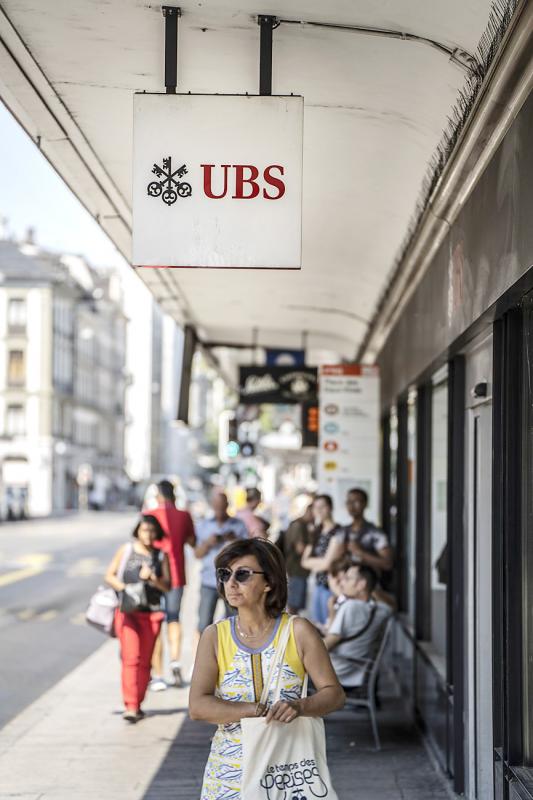UBS Group AG reported weaker-than-expected profit in the second quarter, as the global market sell-off kept wealthy clients on the sidelines and institutional investors pulled funds.
The Zurich-based bank reported net income of US$2.1 billion, compared with analyst estimates of US$2.4 billion. The quarter was affected by lower revenues at the key wealth management business, outflows in asset management and investment banking results that also trailed expectations.
“We saw private clients, given all the uncertainty, sidelining their money and waiting for things to clear up,” UBS chief executive officer Ralph Hamers said in an interview with Bloomberg Television.

Photo: Bloomberg
Earlier, he called the second quarter “one of most challenging periods for investors in the last 10 years.”
The Swiss bank posted pre-tax profit for its wealth management business of US$1.16 billion, weighed down by a slump in client trading activity particularly in the Americas and Asia.
While Asia posted improved inflows that could signal an activity rebound ahead, overall net new fee-generating assets were muted.
The asset management division posted US$12.1 billion in outflows as investors exited equities during the turbulent quarter. The unit’s revenue included a gain from the sale of UBS stake in a Japanese real-estate venture partly held with Mitsubishi Corp.
UBS’ investment bank, which is heavily geared toward equities, posted profit before tax of US$410 million in the second quarter, compared with analyst estimates for income of about US$511 million. Trading revenue was up 4 percent, after the effects of last year’s default of Archegos Capital Management LLC were accounted for.
UBS also cited lower compensation costs at the investment bank, as the market declines cool what had been a fierce bidding contest for talent.
UBS confirmed its plans to buy back about US$5 billion in shares this year, with more than US$3 billion already completed in the first half.
The lender also signaled the potential for higher litigation provisions relating to a long-running French tax evasion case, and said that in general, the bank continues to be “exposed to a number of significant claims and regulatory matters.”
Earlier this year, UBS said it halted all new business in Russia, where it had about 70 employees, and is in the process of reducing its exposure to the region.
Since then, the bank disclosed a US$100 million hit from Russia-related transaction settlements in the first quarter and said it could rise in the second quarter.
After surpassing the US$3 trillion mark in assets under management, the Swiss bank under Hamers is counting on greater use of digital technology to boost cost savings and increase business with the world’s wealthy.
UBS in January agreed to buy US robo-adviser Wealthfront Software LLC and has launched mobile applications in Europe and Asia, seeking to encourage clients to engage on investments in the same way they browse Netflix for movies.

To many, Tatu City on the outskirts of Nairobi looks like a success. The first city entirely built by a private company to be operational in east Africa, with about 25,000 people living and working there, it accounts for about two-thirds of all foreign investment in Kenya. Its low-tax status has attracted more than 100 businesses including Heineken, coffee brand Dormans, and the biggest call-center and cold-chain transport firms in the region. However, to some local politicians, Tatu City has looked more like a target for extortion. A parade of governors have demanded land worth millions of dollars in exchange

An Indonesian animated movie is smashing regional box office records and could be set for wider success as it prepares to open beyond the Southeast Asian archipelago’s silver screens. Jumbo — a film based on the adventures of main character, Don, a large orphaned Indonesian boy facing bullying at school — last month became the highest-grossing Southeast Asian animated film, raking in more than US$8 million. Released at the end of March to coincide with the Eid holidays after the Islamic fasting month of Ramadan, the movie has hit 8 million ticket sales, the third-highest in Indonesian cinema history, Film

BIG BUCKS: Chairman Wei is expected to receive NT$34.12 million on a proposed NT$5 cash dividend plan, while the National Development Fund would get NT$8.27 billion Taiwan Semiconductor Manufacturing Co (TSMC, 台積電), the world’s largest contract chipmaker, yesterday announced that its board of directors approved US$15.25 billion in capital appropriations for long-term expansion to meet growing demand. The funds are to be used for installing advanced technology and packaging capacity, expanding mature and specialty technology, and constructing fabs with facility systems, TSMC said in a statement. The board also approved a proposal to distribute a NT$5 cash dividend per share, based on first-quarter earnings per share of NT$13.94, it said. That surpasses the NT$4.50 dividend for the fourth quarter of last year. TSMC has said that while it is eager

‘IMMENSE SWAY’: The top 50 companies, based on market cap, shape everything from technology to consumer trends, advisory firm Visual Capitalist said Taiwan Semiconductor Manufacturing Co (TSMC, 台積電) was ranked the 10th-most valuable company globally this year, market information advisory firm Visual Capitalist said. TSMC sat on a market cap of about US$915 billion as of Monday last week, making it the 10th-most valuable company in the world and No. 1 in Asia, the publisher said in its “50 Most Valuable Companies in the World” list. Visual Capitalist described TSMC as the world’s largest dedicated semiconductor foundry operator that rolls out chips for major tech names such as US consumer electronics brand Apple Inc, and artificial intelligence (AI) chip designers Nvidia Corp and Advanced